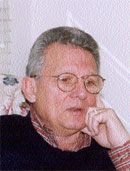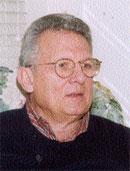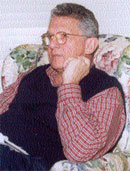|
|
Deacon John Pistone: “Deacons have been called to empower and motivate others to service of the church.”
Catholic New World photos/Sandy Bertog
Diaconate a ‘wonderful journey’ for Pistone
|
|
|
|
The Interview, a regular feature of The Catholic New World, is an in-depth conversation with a person whose words, actions or ideas affect today’s Catholic. It may be affirming of faith or confrontational. But it will always be stimulating.
|
|
For this issue, at the end of Vocations Awareness Week, Catholic New World staff writer Michelle Martin talks with Deacon John Pistone.
Deacon John Pistone, 68, was one of the first permanent deacons ordained for the Archdiocese of Chicago. Back when he was ordained in 1972, he jokes, people hardly knew how to spell “deacon,” let alone knew what deacons do. For the past year and a half, Pistone has served as director of diaconate formation. Before that, the Arlington Heights resident served as executive director of the U.S.Bishops Secretariat for the Diaconate, and as executive director of the National Association of Diaconate Directors, all following a business career with Allstate.
The Catholic New World: How did you first begin to consider the diaconate?
Deacon John Pistone: A priest friend of ours came over for dinner and placed an application for the diaconate on my dinner plate, and said, when your children are old enough, you might want to think about this ministry. My wife and I talked about it, and before you know it, we were involved in formation. It’s been a wonderful journey in service to the church, and a tremendous opportunity of growth, not only for me, but for my wife and I as a couple.
TCNW: Wives are encouraged to participate in the classes and the formation, and also in the ministry. Was that the case when you were in formation?
DJP: In the first classes, wives weren’t invited, except for special occasions, to participate in the formation process. It was really a matter of trying to find out what it was all about for the men. They quickly realized that it was important that wives be more involved, because the couple needed to grow together spiritually as well as, at each step of the way, our wives have to give permission ultimately for us to be ordained. In order for them to give informed permission, they have to understand what it is we’re getting into.
TCNW: We often hear that the diaconate is the “invisible ministry,” because some people still don’t understand what deacons do. How do you explain it?
DJP: The Holy Father has said, and I think it’s a wonderful definition, that the diaconate is the sacramental sign of service to which all the baptized are called. So deacons really are supposed to be visible in the community and by their lifestyle and their words, set an example and invite all the church to service. In 1994-95, we did a nationwide survey on the diaconate, including bishops, pastors, wives, lay leaders. That survey resulted in the fact that most people felt the diaconate was very important to the life of the church. When they were asked what do deacons do besides help the priest on the altar or baptize or celebrate marriages, they said they didn’t know. So very much, most of what deacons do is transparent to most people, unless they’re working in soup kitchens or prisons or jails or hospices. … So we need to do a better job of making it more visible, not to puff up the diaconate, but to help people become aware that’s what the Lord’s calling all of us to do. We’re working on that, and that should show up in a deacon’s preaching, as well as his inviting others to join him in the things he’s doing. It is very important to the diaconate ministry to be very collaborative. Deacons have been called to empower and motivate others to service of the church.
TCNW: How has the diaconate formation program changed?
DJP: The program is currently in transition. The bishops in June of 2000 approved a new national directory for the diaconate in the United States. We’re still awaiting approval from the Vatican, which should be coming soon, hopefully, but we’re in the process of implementing the various directives. One of the major changes is that we now have a year of aspirancy, which is a period of discernment for both the man and his wife, to get a better idea of what the diaconate is all about, of what effects it may have on them individually and as a family, and to really pray about whether the Lord’s really calling them to this ministry before they move into formal formation. We go through a series of 10 monthly small-group sessions as well as a practicum of sorts in social justice so they can begin to experience what it is deacons are about to see if that really does harmonize with who they are and what they feel their gifts are. At the end of the process, if everything looks solid from our side as well as their side, then they’re recommended to the admissions board for review and then recommended to the cardinal for them to move to the next step, which would be candidacy. At that point, we move into a three-year program of formation which has four dimensions to it: the human, which deals with how to communicate effectively, skills for interpersonal relationships, things which are important when dealing with people as well as getting better insights into their own human personalities. Then there’s the intellectual aspect of the program, which goes through the whole range from Christology to Scripture to ecclesiology. Then there’s the spiritual side, in which the men and their wives are taught various prayer forms, and the men are all required to have spiritual directors. The last dimension in formation is pastoral, in which they actually experience what ministry is all about, in hospital settings, prisons, jails, nursing homes, various institutions within the archdiocese. That’s kind of the basic context of the four pillars of formation.
TCNW: How was there time for that in the two years of formation before you were ordained?
DJP: There wasn’t. I’ve been in continuing formation for 29 years, and that’s important for every deacon, because until you get out there working with people, you really don’t realize what you don’t know. In our archdiocese, there’s a requirement that every deacon complete 60 classroom hours every two years. Even with the four-year program, there are some areas that we just introduce the men and their wives to, and they’ll have to explore those further as they get into actual ministry.
TCNW: What would you say to somebody who came to you and said they had been recommended to the diaconate, but they didn’t really know if they had a call to become a deacon?
DJP: I get real concerned when somebody comes and says I definitely know that I’m called to become a deacon. A calling is a gift and a mystery and we can’t always get our hands around it. We have to look within ourselves for certain characteristics. Am I a person who is serving the church and the community and society now? Is that part of who I am? Am I person who relates to others well and works collaboratively, within the parish and within organizations? If I’m not, then maybe I’m not called to be involved in the type of ministry deacons do. Do I have a stable marriage if I’m married? Do I understand what a celibate life really demands if I’m single? Am I financially secure, because there’s no salary with these jobs. If you have a family, you have to have a job that’s adequate to provide for your family. Do others see in me the kind of characteristics that exhibit leadership, humility, a willingness to listen to other people’s points of view? Mindset is really important.
You want to ask the individual to consider a series of questions, and to reflect on those. It’s important to get feedback from his pastor, from parish leaders and from his own family. Through that process, this trust that the spirit will ultimately help him discern whether he’s being called. I liken it to a marriage engagement. An engagement period is supposed to be a time of testing and discovery and evaluating whether this is the person you want to spend the rest of your life with, if there’s a compatibility there and a friendship. I think the whole formation process is very similar. You’re in the process of really discovering whether this is a ministry you’re willing to lay your life down for, because it is a lifelong commitment. It’s not a volunteer program—just like marriage isn’t voluntary, once you’re married.
top
Front Page | Digest | Cardinal | Interview
Classifieds | About Us | Write Us | Subscribe | Advertise
Archive | Catholic Sites | New World Publications | Católico | Directory | Site Map
|









